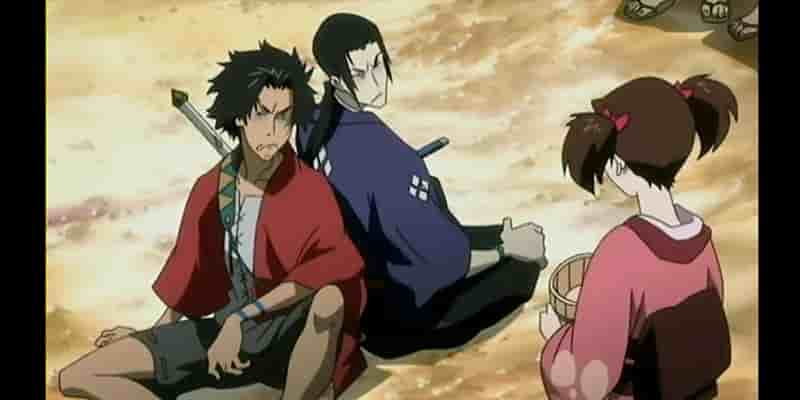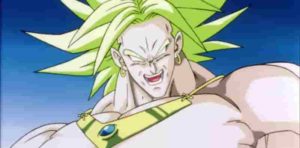In many ways, Samurai Champloo is the spiritual successor to Shinichiro Watanabe’s popular Cowboy Bebop anime, sharing similarities in philosophy, style-fusion and character building. The plot is driven by 3 characters: Fuu, the teenage girl in search of a “sunflower samurai”, and 2 diametrically opposed swordsman in need of work. Though the show is episodic in nature, the search for this mysterious samurai threads these character arches together.
So, who is the samurai who smells of sunflowers?
In short, the samurai who smells of sunflowers is Fuu’s estranged father. However, the search for this person has deeper meaning in the show, analogous to purpose—or lack of purpose. The descriptor “smells of sunflowers” is nonsense, as sunflowers don’t really have a distinct smell. That said, the search for this person brings together 3 unlikely friends who grow through the journey. This is the point.
The Meaning of Champloo
Champloo is a stylization form of the word chanpuru, an old Okinawan word meaning “mixed up” or “stirred together”.
Once again, Watanabe uses western music as an influence. This time, he creates an anachronistic Edo-era Japan with elements of hip hop. Thus, the “mixing” element of “champloo” takes a new, “remixing” spin. Of course, this metaphor goes a few layers into the story. Not only is it stylistically mixing hip hop culture with Edo-era Japan, the stories, timeline and sense of character direction is mixed up as well.
This is where the idea for a “sunflower samurai” comes into play. The nonsense of a man smelling like an ordinary flower, or what that smell actually is, is core to the story overall.
In fact, the main characters’ entire sense of purpose is all mixed up.
Analogy of Purpose
In the beginning of the series, Fuu tosses a coin, telling Jin and Mugen that if it landed on heads, they would have to postpone their duel and help her. She flips the coin, it turns up in her favor, they move on. Funny thing is, she lied, and they never even questioned it. Each of these characters shares a need to fill a void in their respective lives, and they didn’t realize it until the end.
Like Cowboy Bebop, Samurai Champloo is full of metaphors about the search for meaning in a chaotic world.
Mugen and Jin live a day at a time, often facing death and ready for the day it comes. The adrenaline or discipline of sword fighting keeps them moving forward. This is what makes Fuu the glue of the group (rhyme unintended): she gave them something to do. As hired swords, they fall into Fuu’s story because of this aimless nature. This is what is so endearing about the relationship that builds between the 3: they’re all so lost they run into each other.
Check out more anime articles.
DBZ: Why Does Broly Hate Goku?
| Cowboy Bebop: Why Did Edward Leave?
|
The Legend Himself
Not all samurai are legendary swordsmen. As Samurai Champloo often shows, samurai can merely be a social title. Turns out, this mythical person who smells of sunflowers is a sick, old man on the run.
The final 3 episodes, Evanescent Encounter: Part 1,2,3, finally wrap up the overarching storyline. This one man was the thread that tied everyone together through random adventures across Japan. Mugen and Jin come face-to-face with a group of assassins who happened to be connected to their past. Mugen faces assassins he’s wronged, more savage and animalistic than himself, and Jin must face a master of his own style.
The climax ends in the survival of the heroes, who barely make it through. However, the sunflower samurai was struck down in his weakened state. Fuu told him what she needed to, then Jin’s opponent, assassin Kagetoki Kariya, finishes his mission.
After the whole series, Fuu finds the sunflower samurai right before his death. As it turns out, this plays into the seemingly random story of the trio’s friendship. This friendship is ultimately what the series is about, other than remixing history with a dope soundtrack.
A Little Disappointment
Watanabe has knack for creating lovable characters in painfully realistic situations. Life is strange, with twists, turns, surprises and disappointments, and Samurai Champloo reflects this weird yet beautiful truth.
The sunflower samurai is not the man he was built up to me, falling ill and hiding from society. It was up to Fuu the whole time to find her own meaning through closing this chapter in her young life. For a moment, we almost forget about this plot-centric character’s existence, but the sunflower samurai pulls us through the adventure and falls away.
Ultimately, the sunflower samurai acts as a plot device. But that’s ok with me.



